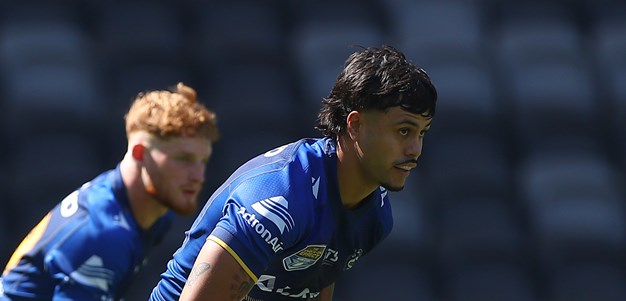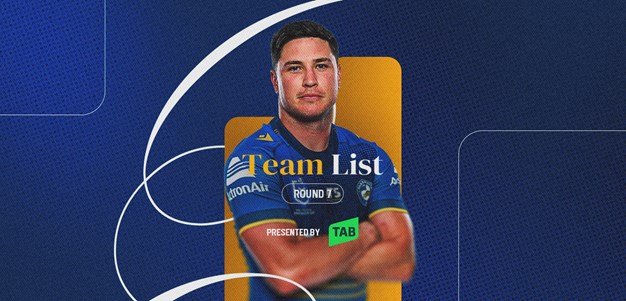It looks like you may be using adblocking software to view this site.
Many features on the site, such as video playback, may not work properly when using adblocking software.
Please whitelist our domain or disable your adblocker to access all features and videos.
Each week NEIL CADIGAN will look back on some of the most eventful moments and most famous names in the club’s 70-year history and bring them back to life. This week we look at the incredible against-all-odds effort of the Eels of 1975 – which brought the club its first top grade trophy.
The miracle comeback of 1975
It was the start of the Parramatta club’s golden era. Yet the feats of 1975, the preliminary to the successive grand final appearances of ’76 and ’77 and the record of seven grand final seasons out of 11, is unfairly overshadowed in the Eels’ annals.
The fact is the Eels emergence from the club’s depths in ’75 was the stepping stone of what became something special – and to achieve it the players had to endure playing seven matches in 16 days!
After making the finals just once in the previous nine seasons, and being last or second last for four seasons straight, the Eels had snared St George’s ten-times premiership winning player Norm Provan as coach. His only previous non-playing coaching role was with Illawarra in the Country Divisional Championships.
His deputy was also a newcomer, a man who would play a prominent role at the club, Terry Fearnley, who – after missing out on the vacant Balmain first grade job when he wanted to progress from being an assistant to Jack Gibson at Easts – took on the reserve grade role.
The club also brought in new blood in the playing ranks, the most significant being Queensland’s tough Test second-rower Ray Higgs, winger Jim Porter who had played in the Roosters’ premiership side of ’74, and another winger in Owen Stephens, who had represented New Zealand and Australia in rugby union.
In those days there was a formal pre-season competition and the Eels surprised the critics by making it to the final, on March 21 at the Sydney Sports Ground, against a star-studded Manly side that included internationals Bob Fulton, Ray Branighan, Graham Eadie, Terry Randall and others.
Parra, whose only previous competition title was the third grade crown of 1964, won 11-5 to take the Wills Pre-Season Cup and give fans new hope as the premiership season arrived.
Yet the progress of a club that had for too long been held back by ill-disciplined, lack of confidence and low expectations, was hardly smooth as Provan and Fearnley tried to establish a hardline attitude.
Provan made a statement when favourite son, prop Bob O’Reilly who had represented Australia for the five previous seasons, was dropped after just three rounds. Provan continually changed the make-up of the side as he searched for success, and used three different captains– Denis Pittard (who was also dropped), John Baker and the side’s most consistent player Denis Fitzgerald.
The competition’s tallest player, fullback Phil Mann, and its shortest in halfback John Kolc, were introduced as the changes continued with only second-rowers Fitzgerald and Higgs, hooker John McMartin, lock John Quayle remaining permanent members of the pack amidst rumoured player unrest – which led to Provan calling a frank open meeting with his squad to bring the issue to a head.
While Fearnley’s reserve grade side headed the ladder, the top side had lost seven out of nine games (plus a draw and sole victory) and with six games remaining were one competition point above last place. The table read (a top five finals system had been introduced in 1973): Easts 28, Manly 22, Canterbury, St George 20, Balmain 16, Cronulla 15, Wests 14, Newtown 13, Penrith 12, Parramatta 11, Souths 10, Norths 10.
And that’s when Parramatta’s history changed direction.
In the ensuing seven weeks the Eels lost just one match in the premiership – to eventual premiers Easts (now Sydney Roosters) 26-7 - and also went through to the final of the high-profile midweek televised competition, again going down to the Roosters, 17-7.
After going through the Cup semi-final (beating St George 13-6), Cup final, the last four premiership rounds which all had to be won to stay alive, two midweek play-offs after a three-way play-off for fifth spot with Balmain and Wests, Provan’s Eels had endured a schedule that is almost incomprehensible these days … seven games in 16 days!
Unbelievably, in the semi-final they beat fourth-placed Canterbury at the SCG in their eighth match in 23 days, they won again.
“It was incredible when you look back at it now,” said ’75 skipper and later three-decade Eels CEO Denis Fitzgerald. “To spring back against all odds to get to the semi-finals and beat Canterbury was just terrific.
“We had basically mostly local juniors in the squad, the camaraderie built up tremendously - especially playing that many games and winning at the back end of the season - and getting recognised in the media and by the fans after lack of success in previous seasons.”
With O’Reilly back in the side and back to his best, despite already agreeing to join Penrith on perhaps the richest contract in the game at the time (which was kept quiet), the Eels went into the final round against last-placed Norths two points behind fifth-placed Balmain (who played fourth-placed Canterbury) but also equal with Cronulla and Wests who played each other.
The Eels beat Norths 28-13, Wests beat Cronulla 31-7 and Canterbury beat Balmain 17-16 – leaving Parramatta, Wests and Balmain on 21 points. It was declared a ballot would be used to determine who would be drawn to play on the Tuesday with the winner taking on the third side on the Thursday. Balmain were drawn first, so had to get through just one match.
When the Eels went to the Sydney Cricket Ground on Tuesday afternoon, they were heading into their third game in seven days (the Cup final was played the previous Wednesday). They beat the Magpies, who had lost a competition point for an illegal use of a replacement player weeks earlier, 18-13.
They backed up 48 hours later and disposed of the fresher Tigers 19-8.
That meant they had the ‘luxury’ of three days break before heading back to the SCG on the Sunday to take on Canterbury.
The side had a mix of youth, experience and a hard edge. Rookie back-rower Geoff Gerard had been switched to the centres to partner exciting fellow 20-year-old Neville Glover. Higgs and Fitzgerald relentlessly drove the forwards and Quayle and McMartin were displaying probably the best form of their careers, while O’Reilly was in great form.
Former Test back-rower Keith Campbell, who had been in reserves for most of the season and was carrying a groin injury would soon after end his career, was recalled to replace the injured Graham Olling and took on the goalkicking duties from Gerard who was also out injured. McMartin also had to miss the game was replaced by youngster Kevin Webb.
Campbell’s three goals won the dour game, 6-5, with Canterbury centre Mick Ryan scoring the only try.
Their next opponent was second-placed Manly, who they had beaten twice (and lost to once) in ’75.
They had the Sea Eagles on toast early, leading 7-0 after O’Reilly strolled through for a try early and Campbell kicked two goals, and the fairytale looked like it would continue. Then came a turning point that changed the momentum of the match.
Against the run of play, Manly centre Branighan pounced on a pass in the 28th minute that was meant for Higgs and ran 85 metres to score, with Eadie’s conversion giving Manly a 9-7 lead. They went on to win 22-12 – and the Eels incredibly brave run, that had captured the league world’s imagination, had ended.
While the top side bowed out, a fortnight later Fearnley’s reserves beat Cronulla 20-13 in the grand final - coming back from 13-2 down at half-time - to win the club’s second only premiership in all grades over 29 seasons – with a side that included Kolc, Ron Hilditch and John Baker who would play in the first grade grand final a year later.
Weeks later Fitzgerald, Quayle, Higgs and Porter played for Australia in the World Cup (then called the World Series).
Provan stayed only one season at Parramatta (and coached again only once, at Cronulla on 1978-79) and Fearnley was elevated and took the club to the finals for another four seasons, including the ’76 and ’77 deciders.
The easy-beat Eels were no longer.










